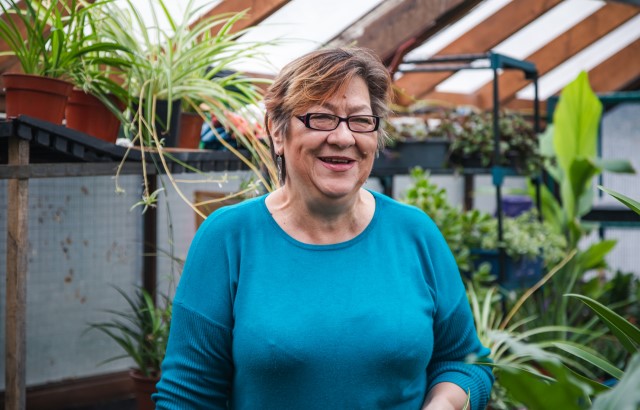
“After my stroke, I spent the next decade trying to find ways to get some sleep”


Alice Timmons, from Glasgow, suffered a stroke in 2010, and a heart attack in 2020 – both of which greatly impacted her sleep.

In 2010, at the age of 56, Alice suffered a stroke. During her recovery, she noticed that she could no longer sleep through the night. “Almost instantly, my eight hours a night became bursts of three to four hours,” states Alice. Over the next decade, she began searching for methods that would help her rest, and she found some tactics that worked for her. “I have blackout blinds covered by blackout curtains. I use wax earplugs – I have tried every kind of ear plug, but wax ones keep the noise out best.”
Then, in 2020, during the COVID-19 pandemic, Alice had a heart attack – though she initially mistook this for indigestion. “It wasn’t terribly painful. I didn’t have any symptoms other than this discomfort in my stomach and throat,” Alice recalls. Luckily, Alice already had a telephone GP appointment arranged about her indigestion, where she voiced her concerns. She was sent to hospital for an electrocardiogram (ECG), troponin blood test, and an angiogram, which revealed that Alice had, in fact, had a heart attack.
After ten years of research and experimenting to find sleeping techniques that worked for her, following the heart attack, Alice faced new challenges. “I began wheezing and coughing at night when I would lay flat,” says Alice. “After maybe two hours, I would wake up feeling as though I was choking. The issue became more mental than physical. Anxiety is much more heightened in those early hours. I was waking up in a fright feeling like I couldn’t breathe, having just had a heart attack, and there wasn’t a lot of support around because this was during the lockdown. That was a very lonely and dark place,” Alice remembers. During this time, Alice reached out to a BHF Cardiac Nurse on the Heart Helpline. “To be able to speak to someone who had knowledge, and who understood why I was afraid, was absolutely invaluable.”
Alice is now taking a diuretic called furosemide which has eased her wheezing at night. However, she still takes every measure to aid her sleep. She has found that practicing mindfulness helps with racing thoughts during the early hours of the morning. She is also an advocate of distraction – “There’s no point lying in bed worrying about the fact that you can’t get to sleep. Distract yourself. Whether it’s reading or playing a silly game on your phone.” Alice also keeps extra pillows to prop herself up if she wakes up feeling breathless. “What works for everyone else might not work for you,” advises Alice. “Don’t give up, keep researching, try any suggestion. You may find a miracle somewhere!”
What happens when we sleep?
“We sleep in cycles of progressively deeper and then lighter sleep. When you put your head on the pillow and you close your eyes, you start off in Stage 1 sleep, which is the lightest form of sleep. It’s not very restorative. It’s the same kind of sleep that you get when you press the snooze button in the morning,” explains Dr Sophie Bostock, former BHF-funded researcher, also known as The Sleep Scientist.
Dr Bostock explains that as we fall into deeper stages of sleep, our heart and breathing rates slow down and our body temperature dips. When we enter Stage 3 or Deep Slow Wave sleep, our bodies repair themselves, which is very protective for the heart. “During slow wave sleep in particular, inflammation is being mopped up and our immune system is working to fight infection. Stress hormones, like cortisol, dip to their lowest levels. We release growth hormone which helps to repair damaged cells,” explains Dr Bostock. “Deep Slow Wave sleep is like this elixir of life!”
Dr Bostock recommends that one powerful way to improve sleep and overall energy levels is to wake up at the same time every single day. This is because of our body’s circadian rhythms, or body clocks, which are also hugely affected by light. “Bright light within the first hour of the day is going to kickstart your body clocks and make you feel energised,” advises Dr Bostock.
For shift workers, who don’t have the opportunity to wake up at the same time, Dr Bostock suggests creating a dark and calming environment for sleep. Darkness promotes the release of melatonin, the hormone that signals the onset of sleep.
“When you’re having a period of poor sleep, it’s vey natural to feel more anxious, not only at night but also during the day,” says Dr Bostock. “If you’re struggling to sleep at night, one of the simplest things you can do, though it may sound counter-intuitive, is to just go to bed a bit later,” advises Dr Bostock. “There are a lot of scare stories about the amount of sleep that we need. For most adults, the recommendation is to get between seven and nine hours, but as we get older, our sleep need reduces slightly. But everyone is different! So, if you’re getting five or six hours a night, but you feel alert during the day and you’re not relying on caffeine, sugar, or naps to get you through, that might be the right amount for you.”
Do you want to hear more from Alice Timmons and Dr Sophie Bostock?

